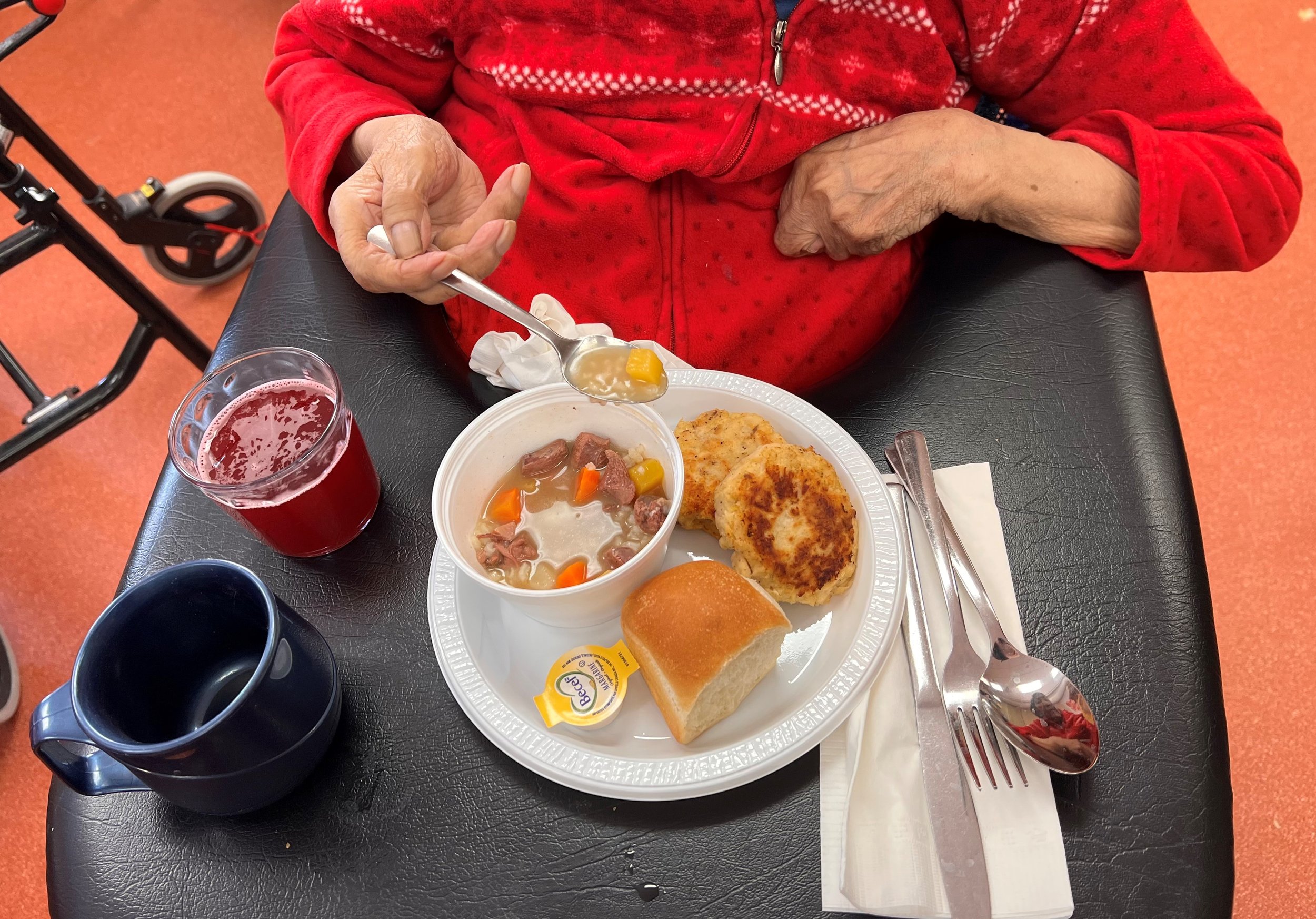
Advocating
Shifting local, provincial, and national conversations on the right to food through advocacy remained a core piece of Food First NL’s work in 2023. Our school food work got a big bump after hiring a fantastic full-time coordinator, just in time for the busy year ahead. We successfully applied for another round with the Labrador Anchor Cohort, which will continue and expand our work connecting local food and healthcare. We also began meaningful conversations about the right to food here in N.L. and offered insights on what’s needed to advance it.
Jump to:
School Food Programming and Policies
In 2023, Food First NL made big steps towards strengthening school food systems. We hired a full-time staff member dedicated to school food, which is a first. We also began a province-wide conversation about the future of school food thanks to funding from the Government of NL and the Pretty-Woodrow Foundation.
Our school food work will continue into 2024, which is particularly exciting given the Government of N.L.’s fall announcement that all Pre-K to Grade 9 students will get school meals. We look forward to sharing what we hear through our engagement process with hopes of supporting the next steps.
We also continued as the Regional Lead for Farm to Cafeteria Canada, which is always an inspiring way to connect with school food enthusiasts around the province.
Learn More
Our Op-Ed with Nourish N.S. on the need for a National School Food Policy.
VOCM article about the provincial school food engagement process.
Food Procurement and Healthcare
Labrador Anchor Collaborative
The Labrador Anchor Collaborative is a collective of Indigenous, government, health care, and community organizations working together to improve access to traditional foods. The Collaborative table is brought together by Food First NL and NL Health Services with members from Nunatsiavut, NunatuKavut, Sheshatshiu Innu First Nation, and the Government of NL. This work is part of a national “cohort” of collaborative teams supported by Nourish Leadership.
2023 was a big year for the Labrador Anchor Collaborative. We completed our two-year membership in Nourish’s second Anchor Cohort (2021-2023) but decided that our work was far from complete. We successfully applied to join the next cohort, which means this work will continue for the next two years at least. Over those years, we want to take some of the lessons learned from our work in Labrador and bring them to healthcare settings across N.L. and expand our on-the-ground work in the Big Land.
Local redberry and bakeapple tarts were served to long-term care residents in Happy Valley-Goose Bay. Photo credit: Sondra Spearing.
2023 Highlights
Continuing to pilot country food meals at a long-term care facility in Happy Valley-Goose Bay
Starting to advise healthcare organizations outside of Labrador on how to replicate this work and navigate complex systems
Sharing our work in Nourish’s 2021-23 Impact Report
Joining the next two-year Anchor Cohort so we can continue and expand our work
“Partridge soup makes me feel like I’m at home.”
A resident enjoying a lunch of homemade partridge soup, local fish cakes, and a fresh roll. Photo credit: Sondra Spearing.
Extending Our Gratitude
The work of the Labrador Anchor Collaborative would be nothing without the participation and leadership of Indigenous partners from Nunatsiavut, Sheshatshiu First Nation, and NunatuKavut. The work of the Collaborative is about reconciliation in action through the restoration of food systems that colonialism works very hard to suppress.
We stand on the shoulders of our Collaborative partners, but also of their communities and ancestors who are holders of the knowledge and perspectives this work aims to centre.
Learn More
Reconciliation in Action: Labrador’s Impact Report for Cohort 2.
CBC interview on our progress getting country foods into long-term care.
Addressing Root Causes
Updated Living Wage
The Living Wage is an important piece of our work. We use it in our policy and advocacy conversations and for our H.R. as a Living Wage employer. That’s why we jumped at the opportunity to support partnerships and funding for an updated Living Wage for all regions in N.L., a first for the province.
The Canadian Centre for Policy Alternatives released the updated Regional Living Wages in December. The report followed a series of focus groups, with funding from the Catherine Donnelly Foundation and a MUNL Public Engagement Accelerator Grant.
Policy Engagements
Our policy work in 2023 crossed many topics that are important for advancing the right to food in N.L. and beyond.
This work included:
Participating in roundtable and one-on-one discussions with federal cabinet ministers about moving forward on a national school food program
Responding to the Province’s new Poverty Reduction Plan by publishing an op-ed with PROOF, Food Banks Canada, Community Food Centres Canada, and the Coalition for Healthy School Food
Co-signing an Open Letter calling for specific and hard targets for reducing food insecurity in Canada
Meeting with provincial ministers and government committees to provide our perspectives on policies that would advance the right to food
Our Advocacy in the Media
Food First NL is occasionally asked to share our thoughts about different advocacy topics related to food systems and food insecurity. Throughout 2023, we responded to 41 advocacy-related media requests, from the national to the provincial on radio, t.v., and in print.
Sharing timely and accurate information is important to us — we want to continue to be a reliable source of information for people in our province. We also want to use our platform to continue pushing for solutions that reduce food insecurity and its root cause, poverty.
Select Advocacy-Related Media
CBC’s The Signal episode on the right to food in N.L.
Saltwire article on the growth in seniors’ food insecurity
NTV segment on the federal ‘grocery rebate’
Globe and Mail article about addressing food insecurity

